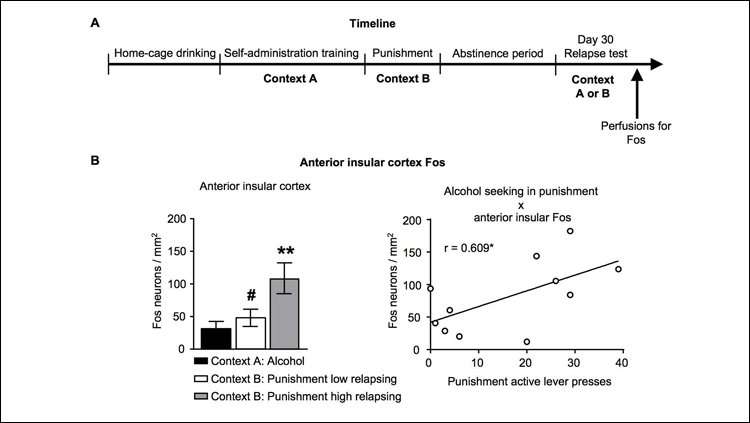Context-induced relapse to alcohol seeking is associated with selective activation of the anterior insular cortex. Outline of the experimental procedure (A). Number of Fos-positive neurons per square millimetre in the anterior insular cortex in rats tested in Context A: alcohol context, or in Context B: punishment context who were either low relapsing or high relapsing. Correlation between alcohol seeking behavior in Context B: punishment context and active lever presses on relapse test (B). Credit: Campbell et al., JNeurosci (2018)
Activation of the anterior insular cortex—a brain region implicated in drug abuse—rather than drinking history or motivation for alcohol predicts relapse after a month of abstinence, reports a study of male rats published in JNeurosci. The results may explain why some individuals are more likely than others to relapse.
Using a recently developed animal model of alcohol-seeking, Andrew Lawrence, Erin Campbell, and colleagues studied a defining feature of human alcohol use disorder: the tendency to relapse following self-imposed abstinence, despite known health and social consequences. Alcohol-using rats were more likely to relapse after 30 days of abstinence in an environment in which they were previously punished with a foot shock, suggesting alcohol-seeking in the face of adversity. This finding is relevant to the human experience of returning to alcohol use after a distressing event, such as an ended relationship or loss of a job.
Identification of the anterior insular cortex—inactivation of which prevented relapse in the punishment context—furthers our understanding the neurobiology of relapse, which could inform preventative strategies for alcohol use disorder in humans.
More information: JNeurosci (2018). DOI: 10.1523/JNEUROSCI.1596-18.2018
Journal information: Journal of Neuroscience
Provided by Society for Neuroscience





















